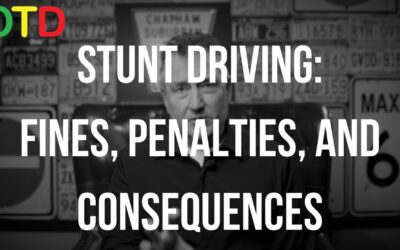How To Fight A Speeding Ticket In Ontario
Getting a speeding ticket can be a stressful experience, and many individuals wonder about the best way to defend themselves against such charges in Ontario. In this guide, we’ll explore the complexities of fighting a speeding ticket and offer insights to help you navigate the process.
The Evolving Landscape of Speeding Ticket Defense
Over the years, the landscape of speeding ticket defense has changed significantly. In the past, individuals might have had a better chance of representing themselves in court. However, with population growth and the increased presence of professional prosecutors, the dynamics have shifted.
Municipal prosecutors now handle many cases, making it challenging for an unrepresented person to effectively navigate the legal system. This shift emphasizes the importance of seeking professional assistance when dealing with a speeding ticket.
Understanding the Demerit Point System
One crucial aspect of speeding tickets in Ontario is the demerit point system. Points are assigned based on the rate of speed, and understanding this system is essential for evaluating the severity of a speeding ticket.
- Zero Points: Speeding tickets that are 15 km/h or less over the limit typically carry zero demerit points.
- Three Points: Once the speed exceeds 16 km/h over the limit, the ticket generally comes with three demerit points.
- Four Points: Speeding 30 km/h or more over the limit elevates the demerit points to four.
- Six Points: Exceeding the speed limit by 50 km/h or more may result in six demerit points.
It’s important to note that there are no two or one-point speeding tickets in Ontario.
The Impact on Insurance Rates
Understanding the potential impact on insurance rates is crucial when deciding how to approach a speeding ticket. Insurance companies often categorize speeding tickets into major and minor offenses, making the distinction between three and four demerit points particularly significant.
A four-point speeding ticket may have a more pronounced effect on insurance rates compared to a three-point ticket. Additionally, reaching six demerit points can lead to further consequences.
Challenges with High-Speed Offenses
For individuals caught driving at speeds of 50 km/h or more over the limit, the consequences may extend beyond a typical speeding ticket. Law enforcement might charge the individual under section 172 of the Highway Traffic Act, known as racing or stunt driving. This charge carries its own set of complexities and penalties.
Seeking Professional Assistance
Given the complexities involved in fighting a speeding ticket, seeking professional assistance is highly advisable. Experienced professionals, such as those at OTD Legal, can assess the specifics of your case, identify potential defenses, and guide you through the legal process.
Conclusion
Successfully fighting a speeding ticket in Ontario requires a nuanced understanding of the demerit point system, insurance rate implications, and potential legal challenges. Professional representation can make a substantial difference in achieving the best possible outcome. If you’ve received a speeding ticket, consider reaching out to our legal team for a free consultation to explore your options and receive the guidance you need.
Video Transcription:
I’m here today to talk to you about a question that’s often asked in my practice. I have several offices across Ontario, and a common question that clients come to me with is; how to fight a speeding ticket in Ontario. It’s a very difficult question because what they’re ultimately asking, I believe, is: “how can I defend myself on a speeding ticket in Ontario?”
The reason I call that complicated is because I look back at the history. I’ve been at this for many years, and when I first started some 40 years ago what I noted was it was much easier for an unrepresented person to attend that court and do a pretty good job on their own without the use of a professional litigator, such as myself or, or one of my staff.
Over the years, there’s been so much population growth. There’s been a shift towards the municipal prosecutors taking over and they’ve hired a multitude of professional prosecutors that any individual would face, including myself. If you’re not familiar with the law and if you’re not familiar with the system, that can be very challenging for someone who’s trying to deal with this on their own.
What I’ve found generally is that the average client that I’ve had over the years are quite bright, sophisticated, many very educated, but they’re stepping into a realm that they don’t know and how could they. I’m there every day. My staff is there every day. We know who to talk to, what to say, how to say it, and what the law is, which is the most important thing.
What I think the problem may be is that there is no one person out there other than a professional advocate such as a paralegal that can help you deal with a speeding ticket here in Ontario. One of the things that a client should be aware of, or we’re certainly aware of is the demerit point system itself and how that works when it relates to a speeding ticket in Ontario.
Points are assigned to speeding tickets based on the rate of speed. So what you’ll find if you were fortunate and you did get a speeding ticket and you were reading on that ticket that your speeding ticket was 15 over. We know from the table that a ticket like that is relatively minor, and more importantly, it carries no demerit points with it.
But as soon as a ticket reads 16 over the limit, it imports three points. So that’s one thing you want to look for on a ticket. The other sort of demarcation line, or the point that you wanna look for on a ticket is when it jumps up to the next tier. So it’s gonna go either a zero point, a three point, or a four point ticket.
There are no such things as a two point or a one point speeding ticket in Ontario. So what I’m telling you is these are what things that you wanna look for. If in fact you are 29 over the limit. So the minute you hit 30 over the limit, you’re going to jump from a three point ticket to a four point ticket.
Most insurance companies, when they view that, that’s a significant thing. We tend to call it here the difference between a major and minor ticket. It’s a deciding factor in setting someone’s insurance rate and certainly something that’s gonna want to raise your eyebrow. So it’s important to know that.
Sort of the next demarcation point I’ll call it, is when it shifts from four points up to six points. So to be at a six point speeding ticket in Ontario you need to be doing 50 kilometers or more. But what I found there lately is there’s very few six point speeding tickets. What happens generally in Ontario these days is when you’re at that rate of speed, you will find that it won’t be called a speeding ticket at all. It won’t be under section 128 of the Highway Traffic Act.
They will charge you under section 172 of the Highway Traffic Act, which is commonly called racing or stunt driving. That is a video or an educational seminar that I’ll do for you at another time. There’s too much information in that. It’ll need its own entity to help explain something like that.




